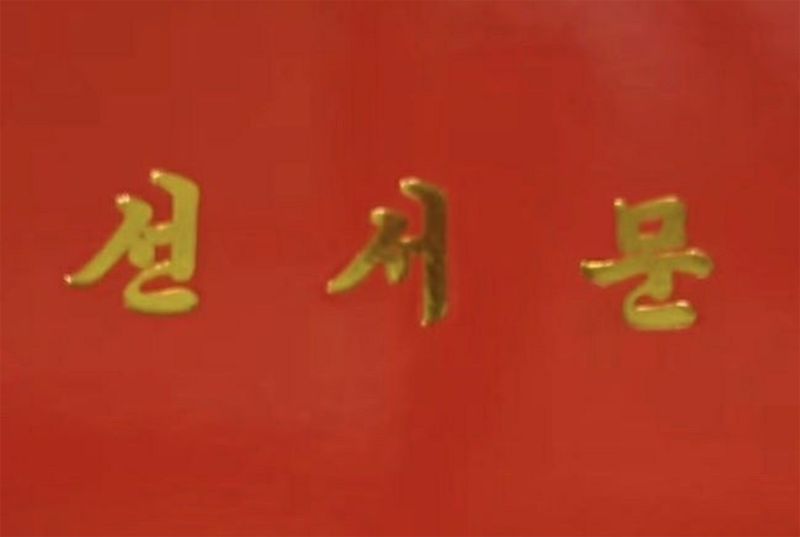North Korea’s supreme leader Kim Jong Un has received a new title, “Great Comrade,” signaling that the leadership wants to emphasize his achievements over his predecessors, father Kim Jong Il and grandfather Kim Il Sung, residents told Radio Free Asia.
The shift from “Great Leader” to “Great Comrade” occurred sometime this month, as the country circulated a five-point oath – shared exclusively with RFA Korean – that must be sworn by all North Koreans to pledge their loyalty.
The oath, sent to all organizations and institutions in the country, is read by officials at various events, including holidays and national anniversaries, and repeated by the people, said a North Korean resident who requested anonymity for security reasons
Each of the five parts of the oath contains the title “Great Comrade.”
The promise commits the speaker to “support and defend” Kim Jong Un “politically and ideologically,” and pledges that they will remain “loyal and obedient” to his sole leadership “at all costs,” and will only follow the “Mt. Paektu bloodline,” which refers to the Kim Dynasty.
National founder Kim Il Sung and the ruling Kim family is said to have strong connections to Mt. Paektu, the tallest mountain on the Korean peninsula and a sacred peak in Korean mythology.
The oath goes on to say the speaker is armed with the “revolutionary ideology of Great Comrade Kim Jong Un” and commits them to “vigorously participate in the construction of socialism,” and fight against anti-socialism.
It concludes by pledging to dedication “to the final victory of the Juche revolution and National Unification.” Juche is North Korea’s founding ideology of self-reliance.
Elevating his status
The five points are preceded by a singular statement about working towards the socialist theory known as “Great Kimilsungism-Kimjongilism” – but after that, neither Kim’s father nor grandfather are mentioned.
The lack of emphasis on Kim’s predecessors suggests that the government wants to elevate his status above them, according to Jiro Ishimaru of the Osaka-based Asia Press, a news outlet that specializes in North Korea.

“In the past there were consistent messages saying that we should not forget the leadership of Grand Marshal Kim Il Sung and Kim Jong Il and carry out their instructions,” Ishimaru said.
“But in this oath, these messages have almost disappeared. It refers to ‘Great Comrade Kim Jong Un’ and only mentions that Kimilsungism–Kimjongilism is to be maintained,” he said. “It certainly seems like a lot has changed.”
The new oath places unique emphasis on Kim Jong Un, whereas previously the government included adherence to the ideologies of the predecessors to project a sense of continuity to enhance the perception of his legitimacy, Cheong Seong-chang, the director of the Center for Korean Peninsula Strategy at the Sejong Institute, told RFA.
“In the past, they expressed their stance to inherit the ideology and policies of Kim Il Sung and Kim Jong Il. But there are many differences between Kim Il Sung-Kim Jong Il’s policies and Kim Jong Un’s policies,” he said. “This oath basically puts Kim Jong Un’s instructions and guidance forward as the absolute standard. So, it seems that Kim Jong Un’s leadership is firmly rooted now.”
Dropping national unification
Recently, the North Korean government has reversed its official stance on reunification, and no longer considers it a priority. This makes the fifth clause of the oath, which mentions national unification, obsolete.
Experts therefore believe that this oath was written in 2021 or earlier.
A resident of North Korea who requested anonymity for safety reasons said that instructions were given to officials to skip the part about national unification when reading the oath.
Experts expect that a revised version of this oath will be circulated soon to reflect the shift away from the South, which in recent months North Korea has defined as its “primary enemy.”
Additionally, Pyongyang has ended economic cooperation with Seoul, and has stopped using language that considers Koreans on both sides of the DMZ as belonging to the same race of people.
Translated by Claire Lee. Edited by Eugene Whong and Malcolm Foster.
